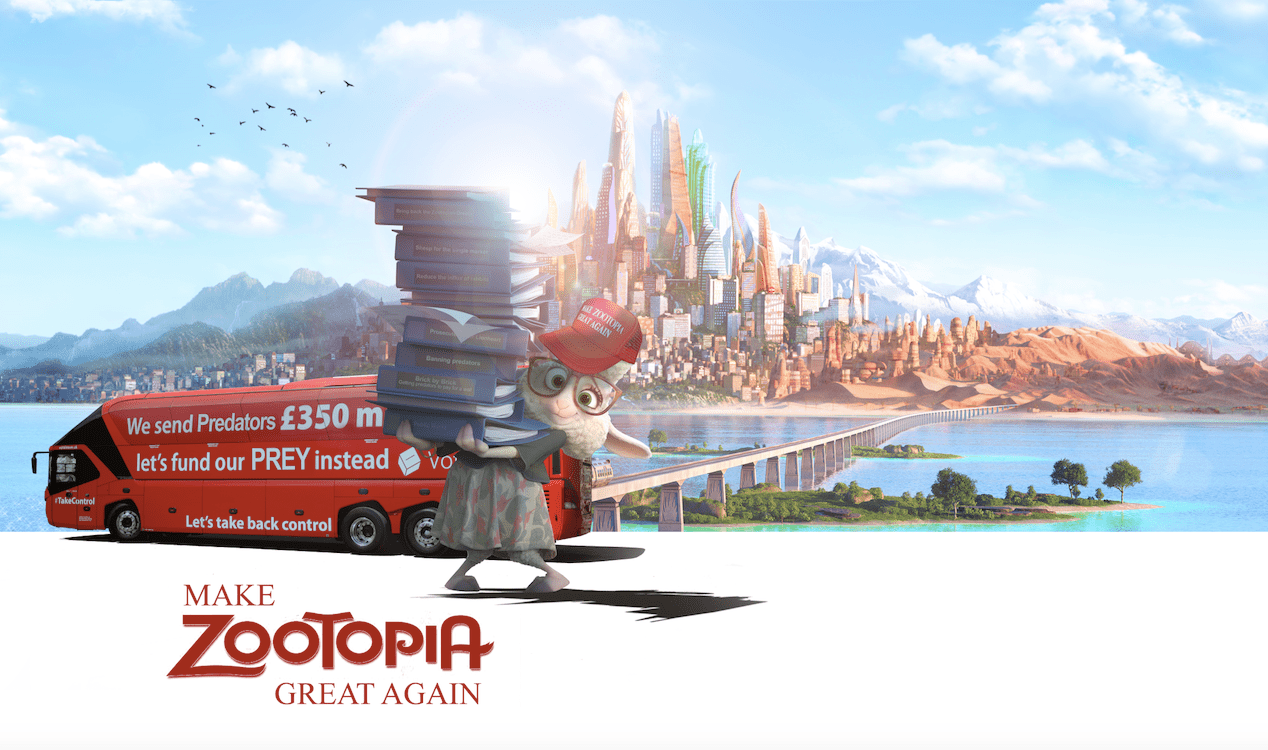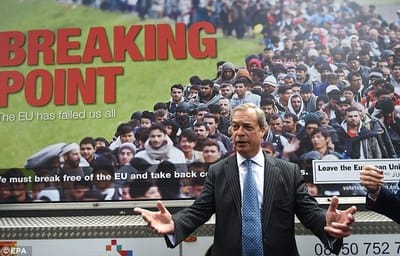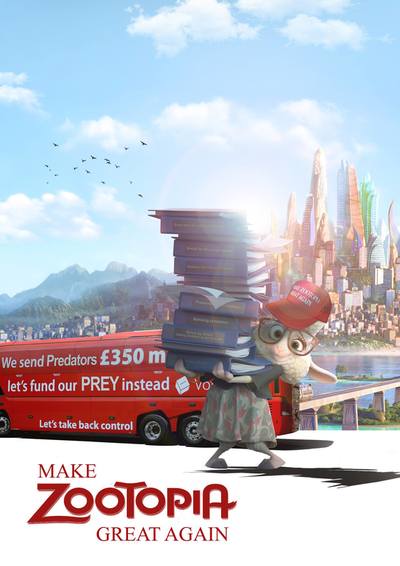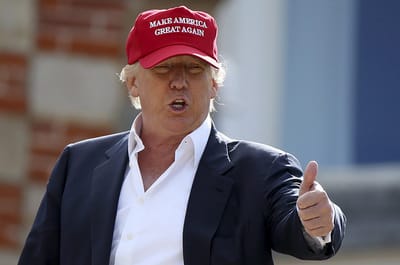(Image by: Oliver Baldock - www.oliverbaldock.com)
In the year of Brexit and Donald Trump, Movie Parliament's Prime Minister, Michael Dalton, explains how a Disney film was the most important release of 2016....
In the year of Brexit and Donald Trump, Movie Parliament's Prime Minister, Michael Dalton, explains how a Disney film was the most important release of 2016....
"Prey fears predator and you stay in power?"
A world in which politicians stoke prejudice for personal gain. No I’m not talking about the year 2016, but the world portrayed in Disney’s animated family film Zootopia. Released in March, Zootopia was praised by critics for its thoughtful and mature examination of race relations. However, few could have foreseen just how prescient the film would turn out to be. This was the year of Brexit and Donald Trump, two seismic political events that have changed the rules of the game, and threatened international stability. These events were huge dents to globalization and multiculturalism, with the United Kingdom voting to leave the European Union, and the United States electing as their President a man who pledged to ban any Muslims from entering the country. With each passing day of 2016 Zootopia became the film that, more than any other released this year, captured the political climate.
Zootopia focuses on Judy Hopps (Ginnifer Goodwin), a bunny who dreams of becoming the first rabbit police officer in the sprawling metropolis of Zootopia, where predators and prey peacefully co-exist. Frequently told that she is pursuing an impossible dream, Hopps succeeds but is at first assigned the drudgery of traffic duty by her superior officers. However, she eventually finds herself at the heart of an investigation into a spate of mysterious predator disappearances. Crossing paths with the sly fox Nick Wilde (Jason Bateman) in the process, Hopps uncovers a conspiracy that threatens to tear down the fabric upon which Zootopia rests.
It is in the relationship between Hopps and Wilde that Zootopia explores the ways in which discrimination can silently entrench itself. Hopps has a lifetime of built-in mistrust against foxes, having been bullied by one as a child, and receiving constant warnings from her parents. When she first sees Nick, she is instantly suspicious, however she chides herself for being so judgmental and ultimately comes to his aid when she sees him and his son being denied service at an ice cream parlor. Hopps then damns him with the faint praise of being a, “real, articulate fella” but discovers that her suspicions were not entirely unfounded, as Wilde is revealed to be up to no good. However, Hopps is forced to re-evaluate her biases when Wilde's ability to hustle helps crack the case.
In a surprisingly moving scene, Zootopia explores how these biases are reinforced. Wilde tells a story of abuse he faced as a child when he tried to be something other than a sly fox. This led him to conclude that there was no point in trying to be anything different. Later, when Hopps inadvertently whips up anti-predator sentiment at a news conference, by suggesting that aggression is in their biology, she is chastised by Wilde who highlights her possession of fox-repellent. It is this innate aversion that she has to him, and the oblivious way in which she stokes fear and discrimination, which highlights how prejudice is not confined to the radical fringes. What permits it at a wider level, is the way such attitudes are gradually, and seemingly harmlessly, normalized. In this scene, Zootopia highlights how the most dangerous forms of discrimination are ones that creep up on us, and result in collectively turning a blind-eye.
When the conspiracy behind the disappearances is uncovered, Zootopia turns its gaze to how easily society can be tricked into turning on itself. It is learned that predators, ‘going wild’, caused all of the disappearances, with their feral state kept secret by the town’s Lion mayor, who feared the political repercussions. However, when he is arrested for his role in silencing the affair, his sheep successor, Dawn Bellwether, is all too willing to pin the blame on the predators, spreading fear across Zootopia. All of a sudden there are protests, prey no longer feel comfortable sitting next to predators on public transport, and even the pop-singer Gazelle is told to go back to the jungle. “I’m from the Savannah” she pleads. Being a part of the Zootopian liberal metropolitan elite, she doesn't realize we’ve had enough of experts, and are living in a post-truth world.
There is nothing new in politicians finding external enemies in order to legitimize their rule. However, what has been chilling about this year, and particularly about Trump’s campaign and post-Brexit Britain, is the way in which this enemy is now to be found from within. 2016 was one of the biggest years for populists yet. Populism is essentially the politics of anger, and its target is the elite, whatever that means, and whomever that consists of. The parameters being in a constant state of flux depending on the objective at the time. It is this ambiguity which allows for the hypocrisy of Donald Trump being held up as some sort of champion for the working class. In Zootopia, Hopps' investigation ultimately reveals that the new sheep mayor, Dawn Bellwether, was behind the predator dissappearances. Her motive being to turn them wild and exploit the consequent fear for political gain. “Fear always works!” she claims, as Disney makes the villain of their animated family film a demagogue. Bellwether's rhetoric was not dissimilar in tone, to what we saw later in the year from the Leave campaign and Donald Trump.
Zootopia focuses on Judy Hopps (Ginnifer Goodwin), a bunny who dreams of becoming the first rabbit police officer in the sprawling metropolis of Zootopia, where predators and prey peacefully co-exist. Frequently told that she is pursuing an impossible dream, Hopps succeeds but is at first assigned the drudgery of traffic duty by her superior officers. However, she eventually finds herself at the heart of an investigation into a spate of mysterious predator disappearances. Crossing paths with the sly fox Nick Wilde (Jason Bateman) in the process, Hopps uncovers a conspiracy that threatens to tear down the fabric upon which Zootopia rests.
It is in the relationship between Hopps and Wilde that Zootopia explores the ways in which discrimination can silently entrench itself. Hopps has a lifetime of built-in mistrust against foxes, having been bullied by one as a child, and receiving constant warnings from her parents. When she first sees Nick, she is instantly suspicious, however she chides herself for being so judgmental and ultimately comes to his aid when she sees him and his son being denied service at an ice cream parlor. Hopps then damns him with the faint praise of being a, “real, articulate fella” but discovers that her suspicions were not entirely unfounded, as Wilde is revealed to be up to no good. However, Hopps is forced to re-evaluate her biases when Wilde's ability to hustle helps crack the case.
In a surprisingly moving scene, Zootopia explores how these biases are reinforced. Wilde tells a story of abuse he faced as a child when he tried to be something other than a sly fox. This led him to conclude that there was no point in trying to be anything different. Later, when Hopps inadvertently whips up anti-predator sentiment at a news conference, by suggesting that aggression is in their biology, she is chastised by Wilde who highlights her possession of fox-repellent. It is this innate aversion that she has to him, and the oblivious way in which she stokes fear and discrimination, which highlights how prejudice is not confined to the radical fringes. What permits it at a wider level, is the way such attitudes are gradually, and seemingly harmlessly, normalized. In this scene, Zootopia highlights how the most dangerous forms of discrimination are ones that creep up on us, and result in collectively turning a blind-eye.
When the conspiracy behind the disappearances is uncovered, Zootopia turns its gaze to how easily society can be tricked into turning on itself. It is learned that predators, ‘going wild’, caused all of the disappearances, with their feral state kept secret by the town’s Lion mayor, who feared the political repercussions. However, when he is arrested for his role in silencing the affair, his sheep successor, Dawn Bellwether, is all too willing to pin the blame on the predators, spreading fear across Zootopia. All of a sudden there are protests, prey no longer feel comfortable sitting next to predators on public transport, and even the pop-singer Gazelle is told to go back to the jungle. “I’m from the Savannah” she pleads. Being a part of the Zootopian liberal metropolitan elite, she doesn't realize we’ve had enough of experts, and are living in a post-truth world.
There is nothing new in politicians finding external enemies in order to legitimize their rule. However, what has been chilling about this year, and particularly about Trump’s campaign and post-Brexit Britain, is the way in which this enemy is now to be found from within. 2016 was one of the biggest years for populists yet. Populism is essentially the politics of anger, and its target is the elite, whatever that means, and whomever that consists of. The parameters being in a constant state of flux depending on the objective at the time. It is this ambiguity which allows for the hypocrisy of Donald Trump being held up as some sort of champion for the working class. In Zootopia, Hopps' investigation ultimately reveals that the new sheep mayor, Dawn Bellwether, was behind the predator dissappearances. Her motive being to turn them wild and exploit the consequent fear for political gain. “Fear always works!” she claims, as Disney makes the villain of their animated family film a demagogue. Bellwether's rhetoric was not dissimilar in tone, to what we saw later in the year from the Leave campaign and Donald Trump.
Now, this might all sound a bit heavy for a Disney film, but what makes Zootopia such a triumph is how this nuanced material, is comfortably housed within a breezy and colourful family friendly romp. The film is packed with visual invention and wit, creating a genuine sense of awe as it explores its fantastical world, and generates real laughs out of its puns, references and situational comedy. On the surface, the film is a gripping whodunit mystery, evoking classics such as Chinatown. However, it doesn't derive all of its humour from referencing adult films, and has material that both parents and kids will equally enjoy. A particular highlight is Hopps' attempt to retrieve information from a sloth, which ranks amongst the year's funniest scenes.
Zootopia represents the dream of peaceful co-existence and calls for it to be protected. That protection requires a recognition of our differences, so that we can not let them divide us. But it also requires the bravery to stand up for what is right, even when it is not popular opinion, and to expose those who seek to gain from division for what they truly are. Zootopia ends with a plea. A plea to try and understand, a plea to try and work together, and a plea to just try. And that’s what we all have to do whether we welcome Brexit Britain and President Trump or not. Division is rife, and condemnation all too easy, yet its only achievement will be to further the separation that got us here in the first place.
Zootopia ends on the note that change starts with you. In the aftermath of Trump’s victory it was heartwarming to see people who wouldn’t let it change them, and who had a renewed desire to behave how they’d like to see others behave, and to treat people with the respect that they’d like to receive. This is why it's so important that we have children’s films like Zootopia, or why we have any type of film like Zootopia. Without trying to sound too worthy, it is necessary to have films which celebrate diversity, and preach tolerance and understanding, as it seems to be so lacking in the real world at the moment. As 2016 reaches its end, and we head towards an uncertain future, I can’t think of any film more appropriate to return to, or more worthy of championing, than Zootopia.
By Movie Parliament Prime Minister,
Michael Dalton
Give us your thoughts in the comments below.
Zootopia represents the dream of peaceful co-existence and calls for it to be protected. That protection requires a recognition of our differences, so that we can not let them divide us. But it also requires the bravery to stand up for what is right, even when it is not popular opinion, and to expose those who seek to gain from division for what they truly are. Zootopia ends with a plea. A plea to try and understand, a plea to try and work together, and a plea to just try. And that’s what we all have to do whether we welcome Brexit Britain and President Trump or not. Division is rife, and condemnation all too easy, yet its only achievement will be to further the separation that got us here in the first place.
Zootopia ends on the note that change starts with you. In the aftermath of Trump’s victory it was heartwarming to see people who wouldn’t let it change them, and who had a renewed desire to behave how they’d like to see others behave, and to treat people with the respect that they’d like to receive. This is why it's so important that we have children’s films like Zootopia, or why we have any type of film like Zootopia. Without trying to sound too worthy, it is necessary to have films which celebrate diversity, and preach tolerance and understanding, as it seems to be so lacking in the real world at the moment. As 2016 reaches its end, and we head towards an uncertain future, I can’t think of any film more appropriate to return to, or more worthy of championing, than Zootopia.
By Movie Parliament Prime Minister,
Michael Dalton
Give us your thoughts in the comments below.




 RSS Feed
RSS Feed
